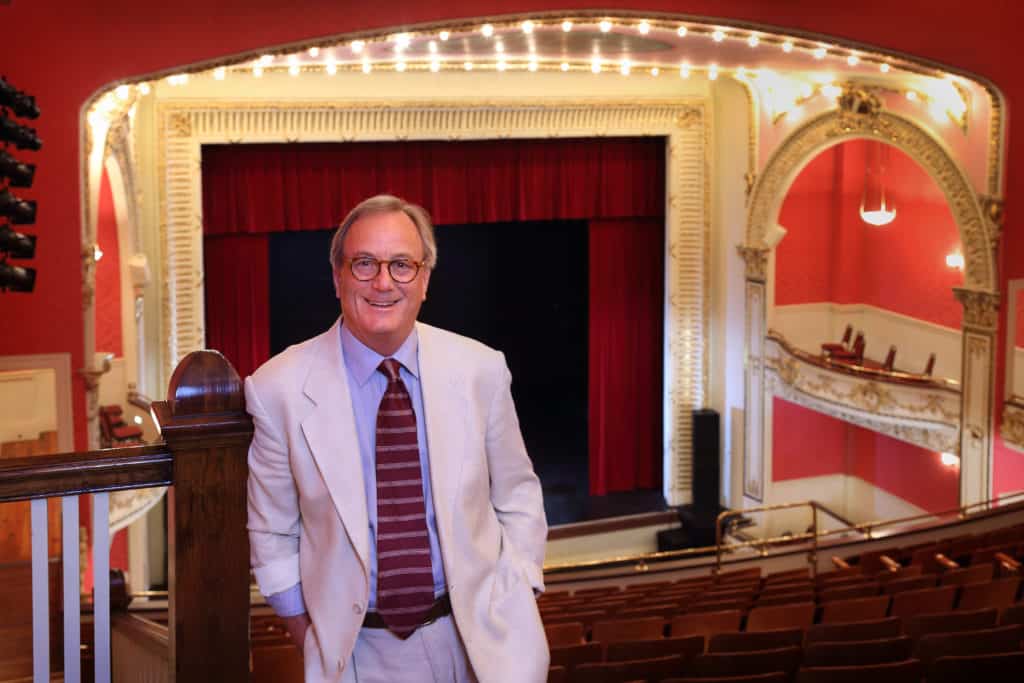
Bruce Bouchard reflects on 50 years in theatre
By Polly Mikula
In his last 12 years in the industry, Bruce Bouchard simultaneously elevated Rutland’s Paramount Theatre, while demystifying its elitism.
Through his efforts, the number of events on the Paramount stage tripled and, though it was six figures in debt when he took the reins in 2008, it’s debt free now. He took risks. He brought in big name acts. He developed new local talent. And he made the Paramount “everybody’s theatre.”
But Friday, Dec. 18, was Bouchard’s last day at the Paramount, and it concludes what was an expansive 50-year career in the industry.
“Last night Maureen and I celebrated my retirement and my birthday. We shared a very nice bottle of champagne and stayed up late,” he said in an interview with the Mountain Times, Saturday, Dec. 19. “So on my first day of retirement, I slept in.”
Bouchard turned 72 on Tuesday, Dec. 15.
While Bouchard officially stepped down as executive director of the theatre, July 1, he’s been filling in as the fundraising and development director — a position the theatre will eventually need to fill, he said.
Eric Mallette, longtime programming director, took over as interim executive director on July 1, and then as executive director on Nov. 23. Mallette, of Rutland, has worked at the Paramount for half his life beginning 17 years ago when he was 17 years old.

The early years
Bouchard said his interest and subsequent career in theatre was a foregone conclusion from an early age.
“My parents were professional dancers with Arthur Murray. I grew up watching them dance. They would go to Vegas three times a year to do ballroom dancing exhibitions with people from four states. There were about 200 people there, and they always concluded with a performance event — usually tango — and I was sitting there going ‘Ooooh, I wish I were doing that!’
Bouchard grew up just outside of Los Angeles with a sister who was six years older.
“The real charge of it all, was when they took me to see ‘Some like it Hot’ when I was 11 years old at the drive in. I’m sitting there in the back seat going: “What the $*@? Grown men in dresses? These people are having more fun than any adult should ever be allowed to have! I want to be Jack Lemmon. I want to be that guy. And that’s really kinda where it started. After that I would not shut up about ‘Some like it Hot’ and my father (who was far more phlegmatic than me) said ‘Kid, when you sleep your tongue rejoices!’ Isn’t that a great line?
“Not long after [seeing that show] he took me to an audition,” Bouchard recalled of his first shot at being on stage. It was at a community theater just six blocks from Bouchard’s house so he could walk to the rehearsals. “I think I was 12 years old auditioning for an 8-year-old boy in this play called ‘Blue Denim,’ which was later made into a bad movie. And I was cast!”
He enjoyed the experience so much that he remembers saying to his parents: “Listen to me, I’m giving you 10 years notice, when I’m finished with college I’m going off to New York to be an actor.” His father’s response was: “What else would you do, of course you are,” he remembered.
“So, yes, they were totally supportive.”
After that, he remembers distinctly that during his first three days of eighth grade drama class, “Miss Joseph read us ‘Glass Menagerie’ … I was like ‘Wow!’ I was blown away… then I did theater in high school all the time.”
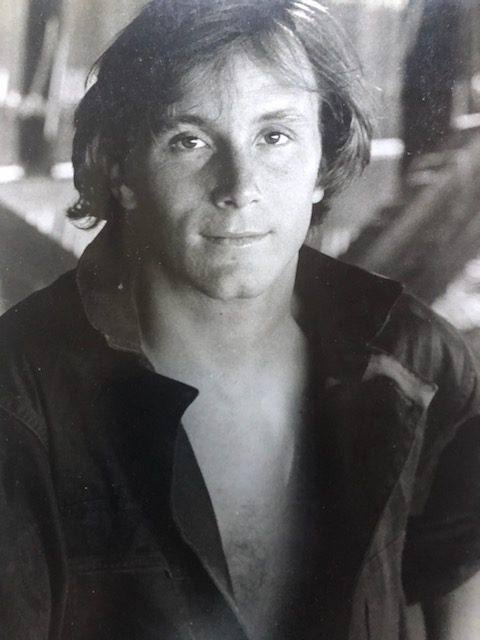
Stepping it up
Bouchard went on to study drama at the University of California at Irvine.
“When I was in college I was very ambitious and I was very busy, but every third weekend I was free I decided that I’d go to L.A. and start seeing theater and seeing who I like. Then I would try and get involved, volunteering at the organization. Long story short, that’s exactly what I did with this company called the L.A. Company Theater.
“The third weekend I was there filing and painting the bathrooms, the artistic director dropped in and said ‘Who are you? What are you doing here?’ I said ‘I’m a theater student at Irvine and I have some time on my hands and I just love your work, so I thought I’d come up and help.’
“So we got to know each other a little bit and the next thing I know he invited me to his professional acting class on Wednesday nights… Now I’m taking a professional acting class at 21 years old in Los Angeles with a brilliant man.”
Bouchard took that class for a year and a half before heading out to New York, as he had planned.
But after being in New York for just six weeks, Bouchard said he was “having a tough time. Everything was grating against my Pacific Ocean, surfer, adventurous, out there kinda background. I was kinda going maybe this place isn’t for me,” he said. And that’s when he got a call from his mentor in L.A.
“He said we’re bringing Liquid Theatre to New York and you’re hired… We want you to organize the audition set up,” Bouchard remembered. Though he felt very unqualified for the job, having had no experience doing anything of the sort nor any connections at the time, he managed to get it done.
“Six weeks later we auditioned 1,000 people, it was a four-week audition process in which 16 people were ultimately cast,” Bouchard said.
Performances took place in the basement of the Guggenheim Museum, where there’s a theater in the round, Bouchard recalled. It “became a smash hit,” he said. “James Joyce Memorial Liquid Theater was running full page ads in the New York Times!”
Bouchard was paid $89/week.
Bouchard went on to act on Broadway and off, and in film. He also produced independently for stage and television, and lectured on theater. From there he co-founded and co-directed two award-winning theaters: Capital Repertory Company in Albany, N.Y. (1981-1995)and Saratoga Stages in Saratoga Springs, N.Y. (2001-2004).
“So that’s how it all started for me,” he said. “Sheer dumb luck and this fact: If you have free time, get busy. Do what you can do to forward your opportunities.”
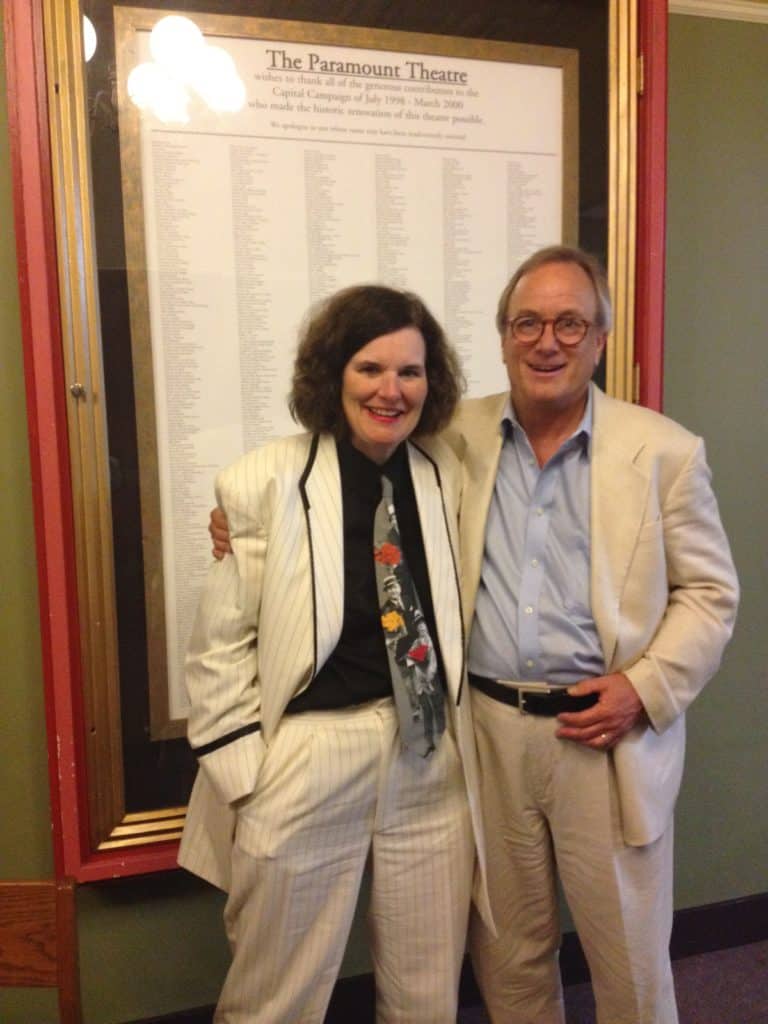
Why move to Rutland?
How, after working in big markets and big theaters, did Bouchard end up in Rutland?
It all started after he left his theater gigs to try something new.
“I took a two-year pause and was coaching corporate CEOs (the biggest divas I’ve ever worked with) to present — one of my little skills is doing presentation seminars, along with throwing rocks at and deeply questioning and scissoring up and remaking Powerpoint, which is the most misused tool on the planet Earth. So I was doing that, I was in a slump, I didn’t like it, but I made money and took care of my family.
“Then I got a phone call out of the clear blue sky from Diane Aliferis Liccardi. I knew her from day one at Capital Rep in Albany in 1981. She called up and said that there was this gorgeous theater in downtown Rutland and they were looking for a director.”
Bouchard did some research and wrote a letter of interest. The board called him and he went to visit. After a 61-day interview process, he was hired.
It was obvious why the Paramount Board was interested in Bouchard, but what was it about Rutland that interested him?
“The real reason I took the job was walking through the doors of the theater… ‘Wow! Wow! Wow!’ It was the perfect mid-large size theater,” he recalled. “I knew that if I brought Shakespeare and Company here with a pretty big production of ‘Hamlet’ (which is what I did a year later), it would feel intimate because there’s only 396 seats downstairs. If you do that same production at the Flynn [theater in Burlington] which is 160-yards deep, and you’re sitting in row MM and you can’t see Ophelia’s face, you’re not really getting ‘Hamlet’… And then we have the 444 seats upstairs to sell out and be able to push the margin of what we can pay artists to put some juice in this place.”
But the transition wasn’t easy.
“Though I came from only 64 miles away, I felt very much like a stranger in a strange land. My background had been in major markets: New York City, Los Angeles, and The Capitol District – places buzzing with ambition, energy and chutzpah. The cultural gap seemed overly large,” Bouchard reflected in a letter to the board upon his retirement.
“I had this ridiculous graduate student apartment,” Bouchard remembered of his early days in Vermont. “And no one reached out to me — at all,” he said. “So I was there just working, the first year about 75 hours a week. It was a problem. I was there late and I was there Saturday and Sunday…you know I’m loud and brash and I’m a flatlander and all those things that some just love to separate from. So that was the mojo at the beginning,” he remembered.
“The area seemed to be suffering from the long hangover of a wicked alcoholic bender of inferiority complex and diminished expectations. If we could only make the Paramount hum and vibrate, I was convinced that our success could lift the whole town and contribute to civic engagement and community pride,” Bouchard continued in his letter to the board.
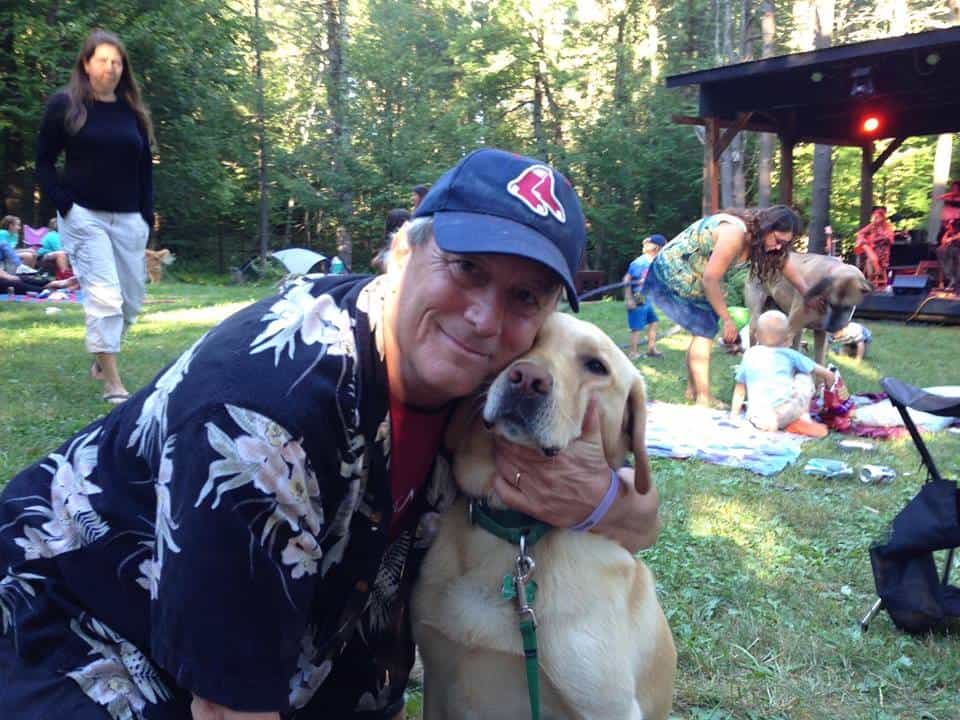
Turning things around
When he arrived, the theatre was in debt to the tune of $160,000. But with careful planning and lots of work, Bouchard cut the deficit in half in less than four months.
Over time things continued to improve. “Everybody got comfortable with me and I got comfortable with them,” he said, admitting, “I was asking a lot of them. At the very first board interview I said, ‘This is an underutilized asset. If we want this place to matter, we got to kick it up!’
“The average artist compensation at the time was $12,000, we got to go to $40,000-$50,000. And we’re not going to skewer our audience with ticket prices. We’re going to run very small margins. So if we have a $50,000 act, and project at 80-90% capacity, we’ll make $3,000. But it elevates the profile of the building — and we really needed to do that,” he explained.
“Everything needed to change. We needed to blow it up and rebuild it again. If they thought that was arrogant and brash and difficult and ego-centric and self-involved, tough! That’s what it takes!”
Bouchard said he got so sick of hearing: “That’s not the way we do things here.”
“What does that mean? They were losing $25,000-$30,000 sometimes on acts. No one really knew what they were doing. They had had four directors in seven years. I was the fifth… Clearly it hadn’t been working, everything needed to change.”
The other problem the Paramount faced was what Bouchard called the “other side of the business.” When he first started, booking agents laughed at the prospect of working with the Paramount, he recalled.
“I’ve had great agency contacts my whole life, so I’d call the agency and say: ‘Could you put me up with your biggest bud in the music department?’ They’d say: ‘Sure call this guy he’ll take your call.’ I’d call the guy and he’d laugh then hang up saying they didn’t have any interest.
“The Paramount didn’t have a great reputation… You see it’s a very cool agreement in this business: It’s a code of integrity; you do what you say you’re going to do, you make paper. If you don’t like that paper, you make adjustments and agree about those adjustments so you can do precisely what you said you would do when you said you’d do it. Your deposit check will arrive exactly when you said it would — mostly by wire — you pay your final payment on the night of the performance, and you treat everyone wonderfully.
“If you do all those things and you have good taste and hire the right artists, then they [agents] sit up and start paying attention. So we had like four big things in a row and the agents starting saying, ‘Oh, hello, Paramount Theater in Rutland. Yeah, you guys have come a long way!”
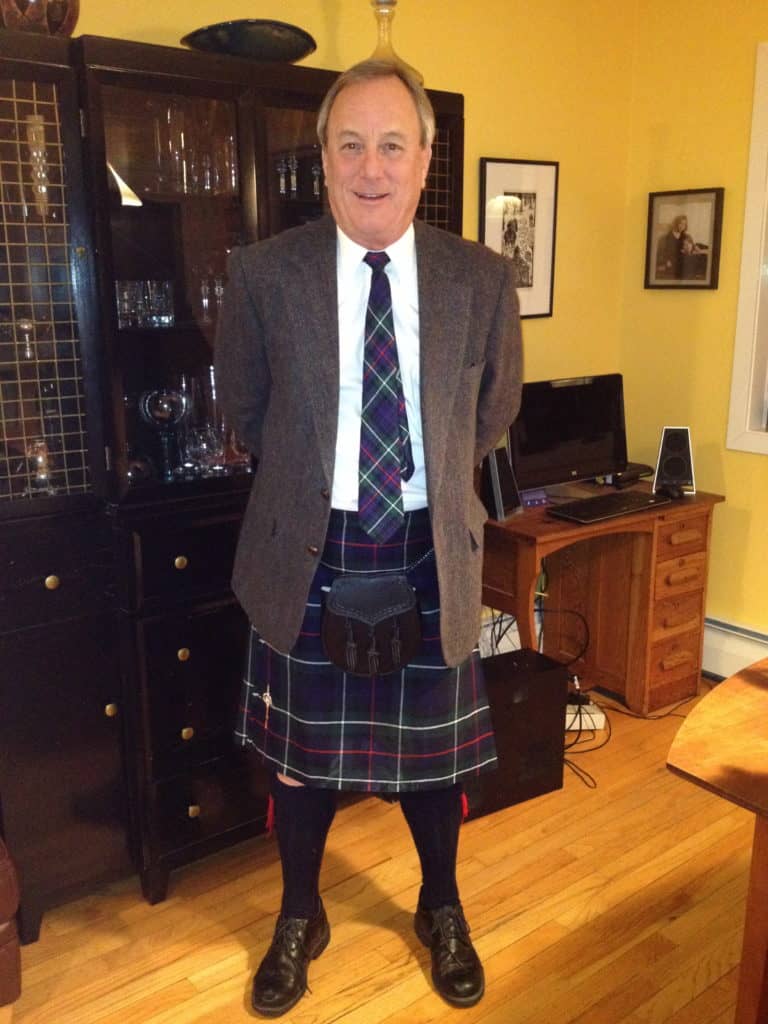
Right-hand man
Eric Mallette deserves a lot of credit for the success of the theatre over the past 12 years, Bouchard said.
Mallette actually pre-dated Bouchard at the Paramount Theatre. He had been there for five years already working through the ranks, when Bouchard arrived. Starting at age 17, Mallette “worked in the coat room, he worked in the box office, he worked in the marketing area, he really learned how this business works and from day one he just started hitting it out of the park,” Bouchard said.
But Bouchard was skeptical at first. “He was now just 22 asking for the second most important job in the building,” Bouchard remembered when Mallette interviewed for program director soon after Bouchard arrived in 2008.
“Eric was well versed in the kind of entertainment he wanted to bring to the building, he’d done his research and he knew who the players were. He demonstrated negotiating skills. He was brilliant. Twenty-five minutes into the interview I knew he was the right person,” Bouchard remembered.
“Taste and instinct are the governing principles and having rich collaborative conversations/debates is endemic to successful artistic enterprises,” Bouchard wrote to the board in his retirement letter of his teamwork with Mallette. “I will look back fondly upon the many exciting endeavors, new initiatives, and risky ventures that were born out of our collaboration.”
“What people don’t know about Eric is not only is he programming, but he’s also managing the production. Tom O’Brien runs all the physical production, but Eric has to deal with artist’s needs and shopping and hospitality, clean up, reconciliation, all that… We have 50 main stage events a year and all in we’re open 160 times a year,” Bouchard said.
When Bouchard and Mallette first took the reins in 2008, however, the theatre was only doing 50-70 dates each year and had an annual budget of $695,000. This year, the budget would have reached a projected $1.75 million, had it not been for Covid-19 and the related mitigation measures shutting the theater down.
When the pandemic hit, Bouchard challenged Mallette “to be more creative than we’ve ever been…. two days later Eric walks in and said: ‘Pop-up drive-in at the fairgrounds!’ And I said ‘That’s the best thing I’ve ever heard’ and it’s been a huge success!” Bouchard said. “I think the Paramount will be in the drive-in business for many summers to come.”
Other Covid-pivots included the fireworks shows and the ‘Stay Strong’ fundraising campaign, both of which have also been successful, Bouchard noted.
“I’m so proud and happy that I’m leaving (to use an Eric Mallette phrase) with ‘plenty of meat in the freezer’… we’re going to be around!” Bouchard said.
The Paramount’s future
“I’ve tried to be careful and not give Eric any specific programing advice. It’s his theatre now to put his mark on it — and he will! The greatest thing about Eric is that he was born here. He knows every lever. He knows who lives behind every door, he knows what they want, and he knows how much they’ll pay for it,” Bouchard said.
In the past, Bouchard said the trend has been “the bigger the name the bigger the success” and that’s been a hallmark of the theater’s success this past decade.
“When we bring big names here the audience can’t believe it. ‘Oh my god Trevor Noah’s in my building!?!’ Bill Cosby (before the troubles) could have sat on a phone book and played with a Slinky and the audience still would have said ‘Wow, Bill Cosby’s in our building’… Every time there’s a name people will respond,” he said.
While he expects that to continue, he said he also hopes that the variety and diversity of acts and uses for the theatre will continue.
“My only advice to Eric, without getting specific about programing, is to stay open to new things, smaller things, the very things that some of the staff weren’t open to in the past. Stay open, ‘cause you’re going to need them,” Bouchard said.
Bouchard added that he very confident about the continued success of the Paramount Theatre under Mallette’s leadership.
“He’s so unbelievably smart, he really is. He has this savvy. He’s a much better business man than I am. He’s about margins and data and math and he’s really good at it. And he has this artistic bend… so I’m very confident that he’ll lead the way.”
Just when Mallette might have the opportunity to program and direct the theatre under normal circumstances again is anyone’s guess.
“The big X factor is when are people going to sit cheek-to-jowl in a building with 799 other people,” Bouchard said. “When is that going to happen? What are the safety protocols that can make that happen that we might not have thought about?”
“But I’m cautiously optimistic,” Bouchard continued. “When the theater reopens people are going to be clamoring to get back in. One little piece of advice I did give him was to program lots of country music. Country is hugely successful in the building and I think its audience isn’t going to be as concerned about cheek-to-jowl.”
Beyond the pandemic, Bouchard hinted at some new plans in the works, but he declined to elaborate.
“There are a few things cooking in the hopper for the long-range future that will not only revolutionize the Paramount, they will revolutionize the entire community,” he said. “It’s thinking big projects, that’s all I’ll say.”
When asked if the projects had to do with the physical building he’d only say “no comment,” but, like a good drama producer, added suspense and anticipation.
“But if it comes to pass…oh my!… but some of the big ideas never get hatched, so we’ll see.”
Fondest highlights
When asked of his fondest highlights over the past 12 years, Bouchard listed a number of top acts, performances and events — from musicians with billboard hits (Brandi Carlisle’s Christmas show was among his favorites) to top comedians (Lewis Black, Bob Marley, Trevor Noah and Paula Poundstone). From sporting events that enticed a new crowd to the theatre, to civic engagements series like Project 240, which again redefined use of the stage.
But of all the wonderful stage performances and events, one stuck out most vividly:
“The first screening of live in HD from The Met, Tchaikovsky’s ‘Eugene Onegin,’ went off at 1 p.m. on Saturday, Oct. 5, 2013. Then, as part of the brand new sports live in HD series, the first Red Sox playoff game of the post-season began at 5:15 p.m. The curtain came down on the broadcast from the Met at 4:55 and as the nicely dressed opera audience exited the theatre, the swag-wearin’ Red Sox Nation fans rambunctiously entered the theatre. Two cultures, two distinctly different audiences, on one day, in early October, in downtown Rutland, Vermont passed on the way out of and the way into the building… I only wish I had videotaped it,” Bouchard wrote to the board.
“I said: ‘Can this even be happening in my lifetime. I mean, I’m an arts guy and a baseball fanatic. So I get eight hours of joy and rapture!’” Bouchard gushed. “Opera and sports on the same day. Just….Wow!”
The fact that sports were playing at the Paramount at all “was a fluke,” Bouchard explained.
Bouchard and staff had set up the huge screen to test its new $50,000 projector and by accident a soccer match came on. “I went ‘oh my god!’ then I had to run around to figure out how to do it legally. I didn’t want Roger Goodell (commissioner of the NFL) to send me a cease and desist letter!”
The theater went on to show MLB, NFL, World Cup soccer and more, including all 17 games in the run-up to the 2013 World Series Championship. All of the live sports events were free for everyone to attend.
“We successfully demystified the elitism of the theatre. I’ve used that phrase over and over, but it’s so true… When we hosted the Daytona, 500 families came in their pajamas,” he said.
And a few lows
As is to be expected in theatre and in life, not all efforts were a success. Bouchard said that while he never expected everyone to love everything as much as he did, there were a few notable disappointments that he regrets.
“One of my biggest disappointments in 12 years was when we showed the National Theater production of ‘Angels in America,’ with Nathan Lane playing Roy Cohn … the whole marketing angle was ‘Angels in America see it before it opens on Broadway’,” Bouchard remebered. “But the subtitle of ‘Angels in America’ is ‘A gay fantasia on American themes.’ Apparently, Rutland didn’t want to know about ‘gay fantasia’ and only 19 people showed up and three of them were from my own family,” he said. “It was heartbreaking. That’s the Great American Play post-1950.”
Another disappointment came with theatre development work, like the 30 Center stage performances, Bedlam, and the Passages series. It was work that inspired Bouchard but too few others.
“Bedlam is a hugely influential company in New York that actually grew up with us in the summers over three residencies,” said Bouchard, who remains proud of those efforts. “But it just couldn’t build enough audience to sustain itself… The same was true for the Passages concerts, the classical concern series, I did 40 concerts in 10 years. This is some of the world’s greatest musical literature and it just couldn’t sustain itself … I just wish there had been more interest outside and inside the building,” Bouchard reflected.

Time to relax and enjoy
After hearing the news of Bouchard’s eminent retirement, “My two mentors who are 82 and 79 got on the phone and screamed at me,” Bouchard related. “They said ‘you’re the worst type A person that we’ve ever known and we know a lot of type A people, so we’re going to give you a directive… Don’t do anything for six months… Go on adventures and have fun and let it come to you.’ So that’s what I plan to do,” he said.
Looking beyond that leisurely benchmark, Bouchard hinted at a new activity. “There’s a writer in me. Could be a book. I also have a play in me about us [himself and Maureen], which I have a lot of mental notes about. A memoir for sure… I’d like to do a semi-long piece about my dog: Charles Wallace the Magnificent, too.”
He also plans to travel with Maureen McKenna, his partner.
“We’re going to the Yucatan Peninsula in a month. They’re open with protocols in place… We’re going to Playa Del Carmen,” he said. “Part of our longer term plan is to go to a place for five months during the cold months: November through April.”
“It’s possible that next summer we’ll take a cross country trip. When Covid hit one of the things that slammed me in the face was: a) reorder all my priorities… b) there a number of people that have contributed enormously to my life that I’ve lost touch with and I’ve been, one at a time, getting in touch with them. So we have some visits across the country to now make,” he said.
“Europe the following summer is for certain!” he added, citing France, Germany and Greece as possible destinations. “Mostly we want to have adventures.”
Heartfelt thanks to the Paramount Board
Even in the beginning, the Paramount Theatre board of directors never said ‘no’ to Bouchard, but he knew the board would have been more comfortable with a more cautious approach. And, consequently, he felt an intense pressure not to fail. In the end, he said it was their trust and guidance that ultimately allowed the theatre to grow to be what it is today.
Bouchard specifically thanked five members in his retirement letter to the board, and reiterated many of those remarks during his interview with the Mountain Times.
• “Paul Gallo, nothing happens in this town without his fingerprints on it. His heart is so big it can’t be contained in one body. He just lives and dies to make the place better,” Bouchard said, adding in his letter to the board about Gallo: “Your heartfelt passion for this town, and for the building make the possible out of the remnants of the improbable.”
• Mark Foley Jr., “took us through unprecedented growth against all odds. I am amazed by your constant humility and avoidance of the spotlight in the business of leaning in and lifting up,” he wrote. Adding, “He quietly tries to revolutionize the town everyday of his life… He became a mentor to me. He’s the intellectual in the room… He’s such a thinker!”
• Laurie Mecier-Brochu was president of the Board when Bouchard arrived. “She inherited a big, huge, difficult task and took us through it,” he said, adding in his letter: “I know you wanted to kill me the first 12 months, but to cite a William Saroyan title, ‘Look We’ve Come Through!’”
• Of Matt Levandowski he wrote: “The calm and ease of delivery that you brought to your presidency made a very real mark. Like the Eagle, the Trust had landed, and it was borne out in your elegance and grace.”
• He wrote of architect Edward Clark: “No one has more time, vision, pain and suffering, and literal miles and miles of travel around our 60,000 square-foot holdings. If we put a dollar on every hour of your deep commitment to this beloved hall, you could give it all to me, and Maureen and I could retire on the French Riviera.”




